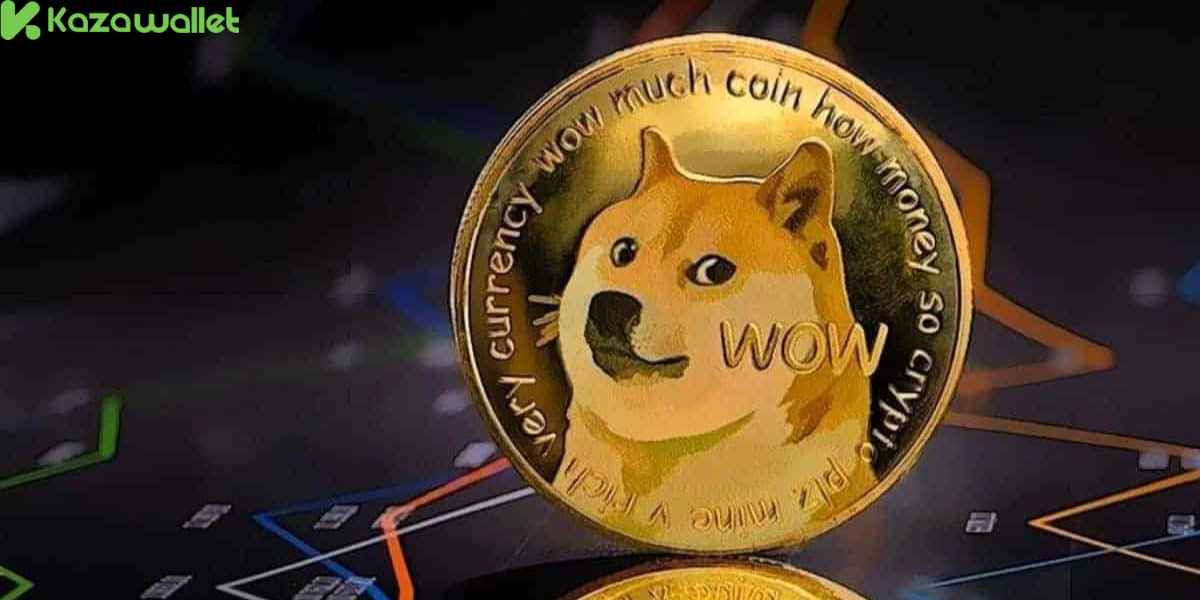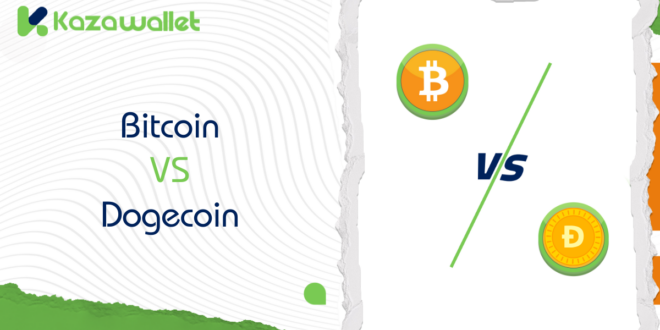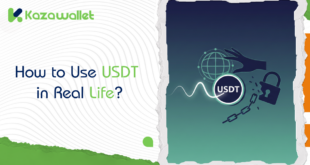The saga did not stop with Bitcoin, the currency that redefined the rulebook for the financial game when it burst onto the scene in 2009. New currencies followed, each with a new concept or created to serve different purposes.
One of those currencies is Dogecoin, which originated as a joke but gained popularity as a global phenomenon because of its friendly community and rising popularity.
Are we comparing apples to apples, though, when we’re comparing Bitcoin with Dogecoin, or are we comparing two vastly different visions for the future of currency?
In this article, we’re going to look at Bitcoin vs Dogecoin, the differences between Bitcoin and Dogecoin, and why each has something special to bring to the table, whether you’re looking for a long-term investment or a payment system for everyday usage.
What is Bitcoin?

Bitcoin is the first decentralized currency that exists digitally, invented in 2009 as the idea for an entirely new electronic monetary system that doesn’t need a middleman, like banks, to operate.
Bitcoin runs independently, with the power of blockchain technology—a decentralized digital ledger that stores all the transactions safely and transparently.
What distinguishes Bitcoin is the limited supply of its coins. It has been designed in a way that only up to 21 million coins can be in circulation at any point in time, making it similar to “digital gold.”
This limitation, coupled with supply and demand factors in the market, makes it desirable as an inflation hedge or as a long-term holding.
However, Bitcoin is not a stable currency. Its value fluctuates wildly due to rapid market changes, making it less suitable as a payment system on a day-to-day level.
How to deposit Bitcoin in Kazawallet in 4 effective steps
What is Dogecoin (DOGE)?

Dogecoin, or DOGE, originated as a joke in 2013, off the back of the ubiquitous “Doge” meme, which featured a Shiba Inu canine.
Billy Markus and Jackson Palmer designed it as a lighthearted, playful counter to the somber world of digital currencies. But the joke caught on on a mass level, thanks to an engaged community and even endorsements by celebrities like Elon Musk.
Dogecoin shares the same blockchain as Bitcoin but has several differences. Bitcoin has a maximum supply of 21 million coins, whereas Dogecoin has an unlimited supply, with the supply on a continuous basis, thus making it an inflationary currency rather than a deflationary currency.
In addition, Dogecoin mining costs less and is easier to do as opposed to Bitcoin mining, making it more accessible to the average user.
USDT vs Dogecoin: A Comparison of Risks and Stability
Bitcoin vs Dogecoin: Differences Between Bitcoin and Dogecoin

While both Bitcoin and Dogecoin are virtual currencies that utilize the blockchain, the two currencies are quite distinct in several ways. The following is the distinction between Bitcoin and Dogecoin:
Main Purpose
One of the differences between Bitcoin and Dogecoin is that while Bitcoin was intended as a “store of value” and an investment to be held long-term, Dogecoin was designed as a day-to-day payment system.
Bitcoin aims to be an investment tool and an inflation hedge, while Dogecoin aims to be a source of practical solutions for daily life.
Stability
Bitcoin has more stability than Dogecoin. This is due to the longer and more solid history that Bitcoin has, making it the better option for institutions.
Dogecoin, on the other hand, has less stability because it has fewer users and lower adoption, making it more volatile. But stability in that sense remains relative. Bitcoin has also proven to be rather volatile in price, but less so with regards to Dogecoin.
Technology
One of the differences between Bitcoin and Dogecoin is that Dogecoin’s technology also varies significantly from that of Bitcoin.
Dogecoin uses the Scrypt protocol as opposed to the SHA-256 protocol that Bitcoin uses. Dogecoin, therefore, takes less time to process and is less power-intensive.
Supply and Market Value
As for supply, Bitcoin has a limit of 21 million units, which makes it scarce and extremely valuable as an investment opportunity.
In the case of Dogecoin, the supply has no limit, and supply remains continuous, and this may lead to the value declining over time provided that demand does not keep up with the increasing supply.
Usage
One of the differences between Bitcoin and Dogecoin is that Bitcoin exists mostly as an investment vehicle or as a hedge against inflation.
While that might be fine for high-ticket purchases, the fees are high and the wait periods are long. Dogecoin, by contrast, is more suitable for everyday use in low-ticket purchases with lower fees and shorter wait periods.
Decentral
Whereas both currencies operate on the principle of decentralization, Bitcoin has proven to be more decentralized due to the far more distributed and widespread network that it has.
Dogecoin, on the other hand, has problems with remaining decentralized due to the lower number of users that it has.
Acceptance and Adoption
Bitcoin is the most widely accepted cryptocurrency, with many major corporations and even some countries accepting it.
Dogecoin, on the other hand, has less acceptance but enjoys a high degree of popularity in certain circles.
Bitcoin vs Dogecoin: Risks Involved

Despite the differences between Bitcoin and Dogecoin and the advantages offered by both cryptocurrencies, several risks must be considered:
The risks involved with Bitcoin:
- Price Volatility: Bitcoin has a reputation for experiencing massive price swings. Its price fluctuates wildly within a relatively short timeframe, making it a volatile asset, especially for those who yearn for financial stability.
- Frauds: The Bitcoin market, too, has its own set of scams. Fake trading sites and copycat coin releases can lead to heavy losses for unsuspecting investors.
- Security Issues: Bitcoin is vulnerable to theft and hacking as long as digital wallets are not properly secured. Loss of the private key or hacking of the wallet may result in permanent loss of funds.
- Regulatory Environment: The regulatory environment for Bitcoin remains uncertain. Its acceptance as a payment instrument or as an investment and its value could be influenced significantly by governmental prohibitions or changes in laws.
- Global Events’ Influence: Bitcoin reacts to global political and economic events. News headlines and economic crises can result in significant price fluctuations, making it less stable than other assets.
The risks involved with Dogecoin:
- Speculative Nature: Dogecoin’s value largely depends on speculation and online hype, and as a result, it fluctuates with sudden and volatile price swings, which could lead to significant losses for investors.
- Competition: Dogecoin has tough competition with other virtual currencies such as Bitcoin and Ethereum, which might restrict its usage and long-term value.
- Lack of Regulation: Dogecoin is a relatively unregulated market, which exposes investors to the dangers of manipulation and fraud in the market.
- Limited Adoption: Dogecoin, unlike other virtual currencies, has not been broadly accepted as a payment option, constraining its utility in the real world. No Maximum Supply: The ongoing supply growth in Dogecoin may lead to a drop in value with the passage of time, as long as demand does not keep pace with the supply growth.
- Volatility: Although Dogecoin does serve as a payment, its price volatility might limit its use as a payment system.
After the differences between Bitcoin and Dogecoin have been clarified, it becomes clear that both currencies serve their own unique purposes.
The market-leading giant, Bitcoin, remains the go-to choice for investors seeking “digital gold” and a store of value. On the other hand, Dogecoin represents the whimsical and playful nature of financial technology, with a focus on everyday usage and microtransactions.
Regardless of whether you view Bitcoin as the currency of the future or Dogecoin as a simple and quick payment system, prudence and in-depth knowledge are the requirements for making an informed decision.
Never mind, managing digital currencies has never been more convenient or secure with the assistance of platforms like Kazawallet, offering a seamless experience for the handling of your assets digitally and safely.
 Blog Kazawallet
Blog Kazawallet




